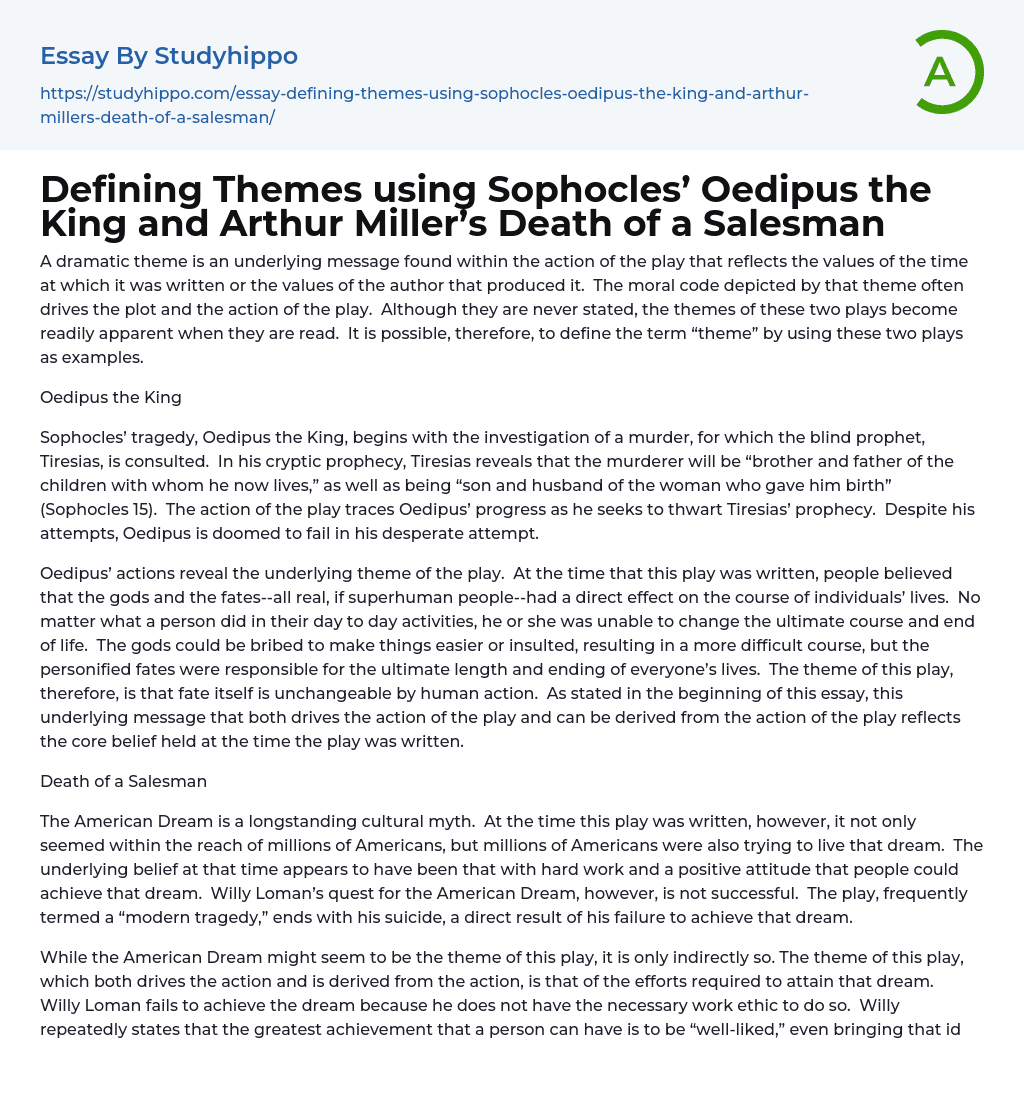A dramatic theme is an underlying message found within the action of the play that reflects the values of the time at which it was written or the values of the author that produced it. The moral code depicted by that theme often drives the plot and the action of the play. Although they are never stated, the themes of these two plays become readily apparent when they are read. It is possible, therefore, to define the term “theme” by using these two plays as examples.
Oedipus the King
Sophocles’ tragedy, Oedipus the King, begins with the investigation of a murder, for which the blind prophet, Tiresias, is consulted. In his cryptic prophecy, Tiresias reveals that the murderer will be “brother and father of the children with whom he now lives,
...” as well as being “son and husband of the woman who gave him birth” (Sophocles 15). The action of the play traces Oedipus’ progress as he seeks to thwart Tiresias’ prophecy. Despite his attempts, Oedipus is doomed to fail in his desperate attempt.
Oedipus’ actions reveal the underlying theme of the play. At the time that this play was written, people believed that the gods and the fates--all real, if superhuman people--had a direct effect on the course of individuals’ lives. No matter what a person did in their day to day activities, he or she was unable to change the ultimate course and end of life. The gods could be bribed to make things easier or insulted, resulting in a more difficult course, but the personified fates were responsible for the ultimate length and ending of everyone’s lives.�
The theme of this play, therefore, is that fate itself is unchangeable by human action. As stated in the beginning of this essay, this underlying message that both drives the action of the play and can be derived from the action of the play reflects the core belief held at the time the play was written.
Death of a Salesman
The American Dream is a longstanding cultural myth. At the time this play was written, however, it not only seemed within the reach of millions of Americans, but millions of Americans were also trying to live that dream. The underlying belief at that time appears to have been that with hard work and a positive attitude that people could achieve that dream. Willy Loman’s quest for the American Dream, however, is not successful. The play, frequently termed a “modern tragedy,” ends with his suicide, a direct result of his failure to achieve that dream.
While the American Dream might seem to be the theme of this play, it is only indirectly so. The theme of this play, which both drives the action and is derived from the action, is that of the efforts required to attain that dream. Willy Loman fails to achieve the dream because he does not have the necessary work ethic to do so. Willy repeatedly states that the greatest achievement that a person can have is to be “well-liked,” even bringing that idea into the fantasies about his death. Speaking to the spirit of his dead brother, Ben, Willy envisions people coming to his funeral from all over New England, leading him to conclude that his death will
help him achieve his dream (Miller 126).
It is a weak perception of the American Dream at best and his efforts at work and at home show that he fails even at achieving that small portion of success. Joyce Carol Oates observes that “in America, [to be well-liked] is not enough” (par. 4). It is for this reason, she observes, that Willy not only fails to achieve the American Dream, but that he also perverts the dream, causing the next generation to exceed the accomplishments of the one preceding it, but not in the manner that the American Dream intends. She observes that while Willy is a salesman, and “sales” being based on rhetoric to part an individual with his or her money, Biff is an overt thief (par. 5).
Conclusion
The plays Oedipus the King and Death of a Salesman both have themes that become readily apparent when they are read. These themes are reflective of the moral values of the times at which they were written. These moral values not only drive the actions of the characters and drive the overall plot, but they also can be derived by the reader’s observation of those actions and the plot, regardless of whether they are openly stated.
- Age Of Enlightenment essays
- Ethos essays
- Time essays
- Acceptance essays
- Meaning Of Life essays
- Reality essays
- Natural Law essays
- Political Philosophy essays
- Utilitarianism essays
- Existence essays
- Free Will essays
- Good And Evil essays
- Confucianism essays
- Relativism essays
- Conscience essays
- Environmentalism essays
- Empiricism essays
- Epistemology essays
- Ethics essays
- Existentialism essays
- Human Nature essays
- Individualism essays
- Metaphysics essays
- Philosophy Of Life essays
- Transcendentalism essays
- Truth essays
- Destiny essays
- Determinism essays
- Fate essays
- Functionalism essays
- Philosophers essays
- Pragmatism essays
- Future essays
- Child Observation essays
- Critical Reflection essays
- Teaching Philosophy essays
- Personal Philosophy essays
- Action Speak Louder Than Words essays
- Can Money Buy Happiness essays
- Values of Life essays
- Ethical dilemma essays
- Normative Ethics essays
- Virtue Ethics essays
- Belief essays
- Deontology essays
- Moral essays
- Virtue essays
- Work Ethic essays
- Henry David Thoreau essays
- Carl Jung essays




